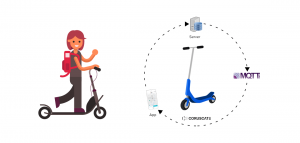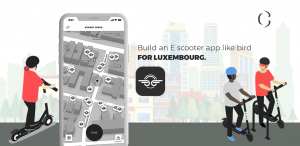Have a look at the ultimate single-window guide for developing an e scooter app in Calgary

A new shared e-scooter startup Roll Scooters has just landed the Calgary market giving competition to Lime and Bird. Roll launched its services on May 25, with 150 fleets, as the city has set the limit on the number of fleets (150/operator) on all the 3 e-scooter operators (Bird, Lime, Roll) till June 22.
Calgary is one of the first cities in Canada that grant permission to ride e-scooters on the street, and now the city has recorded the highest e-scooter ridership in the world. The city is having more than 3000 active users of the shred e-scooter services with more than 2000 trips per day with an average of 15 minutes long.
Not only is the number of shared e-scooter operators in the city are growing up but so does the number of fleets that will soon be available. After June 22, Lime and Bird will be allowed to introduce 1,000 fleets each on the streets, while Roll will be allowed 500 fleets, which makes it a total of 2500 fleets operating on the streets of Calgary.
Roll is a Toronto-based micro-mobility company, established in March 2019 that offers smart mobility solutions such as dockless e-scooter-sharing and bike-sharing services in 3 major cities of Canada – Edmonton, Kelowna, and now in Calgary.
Roll is working in a close partnership with the University of Toronto and is further committed to collaborating with the local governments to expand their business. Roll combines exclusive technologies in hardware and user-friendly app design to ensure a safe and comfortable ride experience for their users. Roll even hires its own team to collect, arrange, recharge, and maintain the fleet.
Each and every fleet of Roll is GPS-equipped to monitor their movement in real-time. Roll scooters are set to have a maximum speed of 20 km/hr and automatically reduce the speed in lower speed zones. Roll charges quite low for its rides just $1 to unlock the scooter and then $0.35/minute compared to its competitors.
In November 2019 World’s #1 mobility as a service (MaaS) app Moovit partnered with Roll scooters and added its fleet of e-scooters and e-bikes to its app in the city of Kelowna.
Roll differentiates itself among the other emerging mobility operators by putting safety first and foremost priority. Roll religiously follows the number of safety protocols released by the Public Health Agency of Canada in the times of COVID-19. Roll disinfects the handlebars of its fleet of e-scooters several times a day, and especially when they enter into its Warehouse. Roll also has a special patrol team to clean and disinfect the e-scooters with sanitizer when they are around the streets.
Roll has launched its new program – Heros Without Capes to support the healthcare professionals who are on the frontlines fighting with COVID-19 and provides them a 30 minutes free ride a day.
Insights into the Canadian shared mobility market:
We have a dedicated blog on every single thing you need to know to build an e-scooter app in Canada including market opportunities, regulations, e-scooter hardware selection, cost & time of development, etc. Click here to read the blog.
Here we will have quick insights into the whole shared-mobility market of Canada to just understand the market scenario. So, let’s get started:
The car-sharing market in Canada:
Canada has more than 20 car-sharing service providers in operation with more than 6000 vehicles. The city of Vancouver in Canada is labeled as the car-sharing capital of North America. A recent Vancity survey has revealed that 95% of the people who use car-sharing in Vancouver choose the services for their convenience, 62% prefer car-sharing to save money, and 58% to save the environment.
There are two types of car-sharing prevalent in Canada, one-way and two-way. In one-way car-sharing, the rider can take a car from location A and drive it to another location B and can drop the vehicle there in their service area. The best example of a one-way car-sharing service is car2go.
In a two-way car-sharing service, the rider can book a car on an hourly basis where the pickup and dropoff location would necessarily be the same, such as Kootenay car-sharing service.
The Ride-hailing market in Canada:
Many cities in Canada have permitted ride-hailing service providers to operates including Calgary, Edmonton, Montreal, Ottawa, Toronto, etc. While in many cities ride-hailing is a very controversial subject and the best example of it is British Colombia. Ride-hailing service is very popular in the small towns of Canada such as Ontario, Innisfil, etc.
Also, the ride-hailing revenue in Canada amounts to US$829M which is very poor in comparison to China’s US$35,589M. However, the revenue from ride-hailing is expected to grow up to US$1067M by 2023.
However, the British Colombian government has introduced legislation to allow ride-hailing services in the province in 2019. But the drivers will need to have Class 4 licenses, meaning they will have to have medical fitness checks and criminal record checks every five years.
Similar to B.C., Saskatchewan has also passed legislation to allow ride-hailing services in the province but the responsibility to issue licenses, and setting fleet standards or fare restrictions is rested with municipalities of the respective cities. In February 2020, Saskatoon became the first city in Saskatchewan to introduce Uber on its streets.
Some of the major ride-hailing service providers currently operating in Canada are Facedrive, Taxify, and Uber. Lyft is only available in Toronto but giving the biggest competition to Uber.
EV adoption in Canada:
Canadians are not opposed to EV adoption but the policies of the government and the local auto industry are not keeping pace with regards to EV- friendly infrastructure, which ultimately makes buying an electric car an expensive risk in Canada. However, we do see EVs being incorporated into car-share fleets by Car2Go, Evo, or Zipcar.
At the end of 2017, Canada has reported having 23,620 electric cars on its streets. That is very much low even compared to smaller countries such as Belgium, Norway, or Switzerland. Canada also placed seventh on the ranking with respect to EV infrastructure having only 0.56 stations in a 100 km span of road. While 1st ranked country, the Netherlands has 23.25 charging stations in a 100 km of road.
Well, the situation is seeming to get better with the passing years as EVs (including hybrid EVs) sales in Canada are going up by 158%, according to the research by Fleetcarma. Due to the incentives such as facilitating charging stations at home at minimal costs or rebates for plug-in vehicles provided by local governments, corporates, non-profit organizations, etc.
The micro-mobility market in Canada:
The micro-mobility market in Canada is quite rich compared to any other shared mobility market having a large number of players in every city and that too from the different countries of the world.
Major players in some cities are Mobi by Shaw Go in Vancouver, TapBike in Greater Victoria of B.C., DropBike in Kelowna, LimeBike in Calgary, Lime in Waterloo, etc.
To learn more about the Canadian micro-mobility market Read our dedicated blog on it.
Autonomous Vehicles in Canada:
Ottawa is the Autonomous Vehicle capital of Canada. There are more than 70 companies contributing expertise in the areas of cybersecurity, IoT, etc to creating AV clusters across the city. More than 45 of the firms in Ottawa’s AV cluster is anchored by global AV leader BlackBerry QNX and located in Kanata North Technology Park. Also, this was the location of Canada’s first on-road AV testing.
What has changed for e-scooters in Calgary post-COVID-19:
Many cities in Canada including Montreal, Toronto, and Vancouver have allowed the bike-sharing system to operate in the city in the past two months. Calgary has also allowed Lime and Bird to operate in the city with a reduced number of fleets (only 150). Calgary’s shared electric scooters operated well during the critical times of COVID-19 but now the cities have released strict rules for both riders and operators in the city in addition to existing rules.
The additional rules are discussed below:
Revised fines:
In an attempt to ensure higher safety for the public and curb irresponsible behavior, the city of Calgary has introduced a series of new fines.
That includes:
- A fine of $400 for operating a vehicle in a reckless manner
- A fine of $400 for colliding with any other users on the street
- A fine of $75 for carrying another passenger on an e-scooter
Special low-speed zones:
In 2019 e-scooters were set to a maximum speed of 20 km/hr, but now the city of Calgary has created special slow speed zones where the maximum allowed speed of e-scooter will be 15 km/hr. In addition to this, the government has released detailed guidelines on shared e-scooters and shared e-bikes on its website.
The introduction of the new Share and Go parking zones:
The new share & go parking zones intended to leave an e-scooter after a ride and will be painted on the sidewalk or in repurposed Car2Go parking areas found throughout the downtown core. If in case of share & go parking zone is not available, e-scooters can be parked upright on sidewalks in line with bike racks.
Want to develop an e-scooter app in the business-ready market of Calgary:
Coruscate is the custom e-scooter app development company. Our white-label solution Rohak is a one-stop solution for your e-scooter business. We had a collaboration with the leading players in shared mobility including Okai, Ninebot, Omni, etc.
We have helped many e-scooter businesses to take off in more than 15 countries of Australia, Europe, the Middle-East, North America, etc.
We leverage our experience and expertise to deliver robust solutions at minimal cost and maximum assiduity. Contact us now to know more about our pricing structures and development process.










